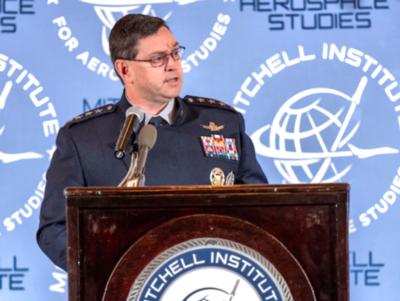Tue, Apr 09, 2024
United States Space Force (USSF) has laid out its blueprint for maintaining U.S. dominance in space
In an era where the final frontier is no longer just a vast expanse for exploration but a domain of strategic competition, the United States Space Force (USSF) has laid out its blueprint for maintaining U.S. dominance in space. On March 31, 2024, Gen. Chance Saltzman, the Chief of Space Operations for the USSF, unveiled this strategy amidst the backdrop of growing rivalry and the cluttering of space with hazards.

Saltzman's remarks at the Spacepower Security Forum, hosted by the Mitchell Institute for Aerospace Studies, came at a critical juncture. The U.S. faces an "incredibly sophisticated array" of threats ranging from space-based GPS jammers and anti-satellite weapons (ASATs) to cyberattacks targeting ground stations and space assets. This increasing militarization of space by nations like Russia and China, particularly their use of space-based intelligence, surveillance, and reconnaissance (ISR) capabilities, underscores the pressing need for the U.S. to secure its space operations.
The establishment of the Space Force, as Saltzman articulated, is a direct response to these challenges, aiming to protect U.S. interests and ensure operational freedom in space. Echoing the commitment of terrestrial branches of the military to dominate their respective domains, Saltzman emphasized that space superiority is foundational to the Space Force's mission. This entails not just protecting U.S. space capabilities but also being prepared to deny adversaries the use of theirs when necessary.

Saltzman's strategy for achieving space superiority rests on a disciplined approach to ensure that space remains a secure, safe, and stable environment for future generations. Central to this vision is the concept of "competitive endurance," which involves three main tenets: avoiding operational surprises, negating adversaries' space capabilities, and engaging in responsible counterspace operations.
These principles are designed to ensure the U.S. and its allies retain unfettered access to and use of space, thereby maintaining a strategic advantage. Saltzman's message was clear: the imperative of space superiority not only secures the U.S.'s interests but also upholds the safety, security, and sustainability of space for all. In the face of escalating threats, the USSF's commitment to a measured and strategic approach to space operations is crucial for maintaining global stability and peace.
More News
Ultrahigh Frequency (UHF) The frequency band between 300 and 3,000 MHz. The bank of radio frequencies used for military air/ground voice communications. In some instances this may >[...]
During The 7 Second Descent, There Was Another TAWS Alert At Which Time The Engine Remained At Full Power On October 24, 2025 at 2115 mountain daylight time, a Cirrus SR22T, N740TS>[...]
From 2009 (YouTube Edition): Educational Organization Aims to Inspire by Sharing Tuskegee Story Founding leader Don Hinz summarized the Red Tail Project’s mission in simple, >[...]
“This feels like an important step since space travel for people with disabilities is still in its very early days... I’m so thankful and hope it inspires a change in m>[...]
Also: New Katanas, Kern County FD Training, IndiGo’s Botched Roster, MGen. Leavitt Named ERAU Dean The Australian Transportation Safety Bureau (ATSB) has wrapped up its inves>[...]
 ANN's Daily Aero-Term (12.19.25): Ultrahigh Frequency (UHF)
ANN's Daily Aero-Term (12.19.25): Ultrahigh Frequency (UHF) NTSB Prelim: Cirrus Design Corp SR22T
NTSB Prelim: Cirrus Design Corp SR22T Classic Aero-TV: The Red Tail Project--Carrying the Torch of the Tuskegee Airmen
Classic Aero-TV: The Red Tail Project--Carrying the Torch of the Tuskegee Airmen Aero-News: Quote of the Day (12.19.25)
Aero-News: Quote of the Day (12.19.25) Airborne 12.17.25: Skydiver Hooks Tail, Cooper Rotax Mount, NTSB v NDAA
Airborne 12.17.25: Skydiver Hooks Tail, Cooper Rotax Mount, NTSB v NDAA



